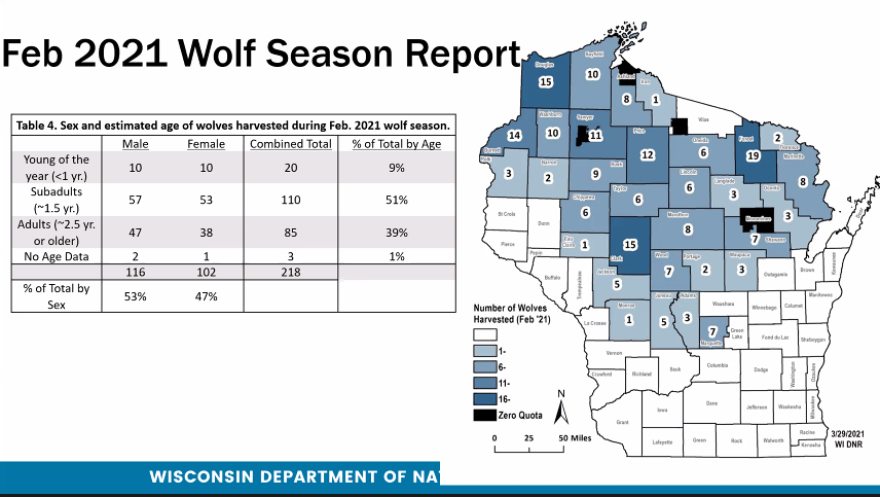Chaotic, rushed, and mishandled are all words Wisconsin’s Green Fire used to describe the state’s February wolf hunt.
Green Fire is a conservation group that supports science-based management of Wisconsin’s natural resources.
It recently released its assessment of the wolf hunt.
Wisconsin’s February wolf hunt was quickly put together after a judge’s order. More than 200 wolves were harvested as hunters quickly went over the quota, shutting down the hunt after just three days.
“To the extent and the quickness to which the harvest occurred was a surprise to all of us,” said Adrian Wydeven. Wydeven has studied wolves in Wisconsin for more than 30 years. He’s currently co-chair of Wisconsin’s Green Fire wildlife working group.
Wydeven said a lot of packs won’t produce pups this year because the hunt happened so late in the season after most packs were done breeding.
“If you had a hunt earlier in the fall, a new breeding female could move in there and breed with the male and produce pups in the pack, but all the females we would have already had their estrus period, so there was no opportunity for new females to move in and breed. You’ve totally eliminated all the pup production in that pack,” said Wydeven.

Green Fire said it is reasonable to estimate that 60-100 of Wisconsin’s wolf packs may lose all pup production due to the February hunt. If that’s true it will represent 24-40% of the expected reproduction.
Wydeven said the hunt also did little to reduce wolf conflicts with livestock and pets, which was a main argument for some supporters of holding a hunt.
“The harvest of wolves were from major core areas of the wolf range in the state and very few of them were in areas where there were high levels of conflict. So as a means for reducing conflicts it probably did very little for that and probably reduced abundance of wolves in areas where they do the most good,” said Wydeven.
The assessment also found the hunt did damage to the state’s relationships with the Ojibwe Tribes and public trust.
For the next hunt, Wydeven said Green Fire is hoping the quota stays at a low level.
The DNR has said its goal is to set a quota that won’t change the wolf population one way or another.
“That’s probably reasonable, not to change the population, but what’s going to be more difficult is just the high level of uncertainty in the status of the population right now,” said Wydeven, referring to the unknown with holding the last hunt during breeding season.
One of the biggest criticisms of the hunt was that hunters went over quota by nearly 100 wolves.

Among other things, Green Fire said a shorter period for hunters to call in their kills would help reduce the likelihood of going over quota.
“There was 24 hours after the harvest was closed before they had to call in their harvest and reduce the number of permits so that we don’t have this kind of an over harvest. Restrict permits specific zones to again reduce over harvest. And that any quota that’s going to be done is going to have to be conservative,” said Wydeven.
Green Fire would also like to see more restrictions on hound hunting in the next hunt.
You can read the full report here.









